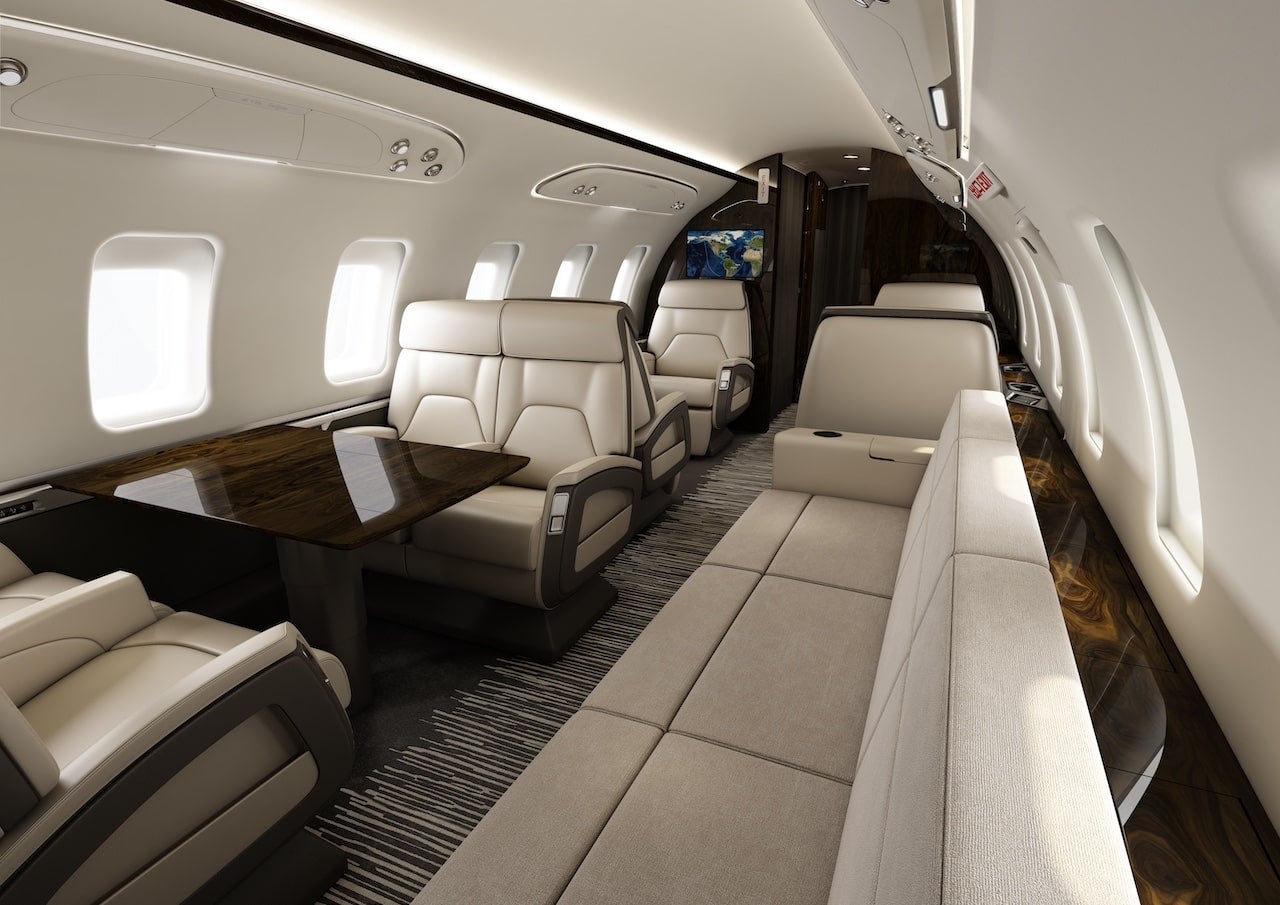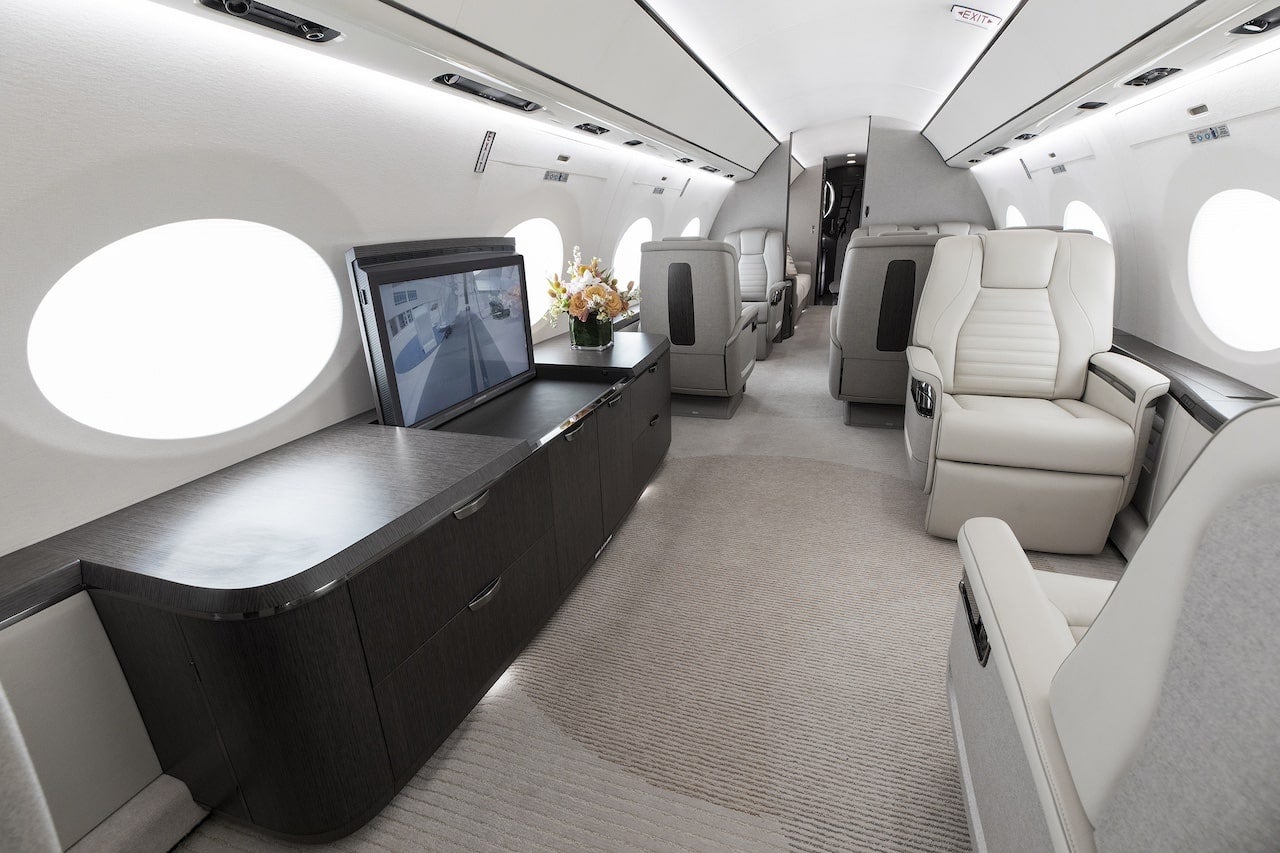As we look to private aviation’s luxury leaders this year, we focus on jet cards. The year 2024 is the 25th anniversary of the jet card’s invention — a product that has proven itself over the years, though it’s not without skeptics. The jet card — particularly those that offer guaranteed availability and fixed or capped hourly rates — fill the ocean-size gaps around chartering flights and owning a fractional share of a private jet, or owning your airplane outright.
The jet card was invented by Sentient Jet, which is now part of Flexjet; the company was founded in 1999 as eBizJets (short for Executive Business Jets) and the jet card was its product. “Sentient Jet’s journey began 25 years ago with the invention of the jet card — a concept that has redefined how people fly privately,” says Andrew Collins, co-CEO at Flexjet and longtime head of Sentient. The early pitch has mostly stayed the same.
Sentient’s 2002 website compares the jet card to fractional ownership this way: “As you might imagine (or have experienced), fractional jet ownership is essentially shared ownership of a heavily used asset purchased at a substantial premium. The downsides to this are many, such as exorbitant acquisition fees. Hefty monthly maintenance fees. Blackout periods. Long-term contractual commitments. Painful exit fees.”
[See also: The Longest Range Private Jets in the World Right Now]

In comparing jet cards to on-demand charter, the Boston-based broker points out: “One-off charter flights charge you for empty legs, landing fees, wait times and positioning. Most important, private jet charter lacks the one-way pricing, responsiveness and nationwide reliability of private jet membership.”
Skeptics skewer jet card providers that use client funds for future flights to pay current expenses, yet there have been relatively few failures. Instead, the model flourished, particularly after the 2008 financial crisis, which led to a glut of aircraft available on the charter market.
[See also: The Biggest Private Jet Companies in the World]
Contrary to common perception, buying private flight time in chunks of 25 or 50 hours doesn’t mean you are getting them cheaper than if you booked them one by one — although, depending on where you are flying, the savings versus on-demand charters can be substantial. The benefits of jet cards are multifold. They mostly bridge the wide chasm between ad hoc charter and fractional ownership, which typically requires a five-year commitment and often involves splashing out millions for a share in an airplane.
Jet cards are less like a marriage and more like casual dating. If things are going well, you can re-up with your current provider. If not, dozens of companies with eager salespeople now offer these memberships. In addition to giving you a fixed or capped hourly rate so you don’t have to wait for a hard quote each trip, many jet cards include WiFi and de-icing, plus expenses for one-off charters.

But the big plus is that it’s just easy. Sentient enables instant bookings via text messages, calls, emails, the Sentient Jet app — even by fax. In minutes you have your flight confirmed. Programs often enable you to choose the aircraft type you want for that flight — a light jet for a short hop or a large cabin aircraft for a family vacation. Sentient typically guarantees recovery flights at the original price — as opposed to when you charter, which can entail paying additional fees.
Crucially, the hourly rates already bake in repositioning so — as Sentient noted on its early website — you can fly out of and into your favorite airports without extra repositioning charges.
[See also: NetJets Announces $5bn Jet Order with Embraer]
Still, Sentient didn’t make this flight on its own. Kenny Dichter has been as instrumental as any single figure in the category. In 2001, he founded Marquis Jet Partners after pestering the then-CEO of NetJets, Richard Santulli, who pioneered fractional ownership, into allowing him to sell time on the Berkshire Hathaway-owned fleet in 25-hour increments.
Fractional ownership required a commitment of 50 hours per year and a five-year contract. With the credibility of Warren Buffett behind him, Dichter flipped the script from the way private jets had been sold as a business tool. Advertising images typically showed executives working diligently on their laptops and conducting meetings. Dichter shifted from the features to the benefits — the leisure lifestyle aspect of private flights. A jet card meant getting home in time for your kid’s soccer game, or ensuring the family pet didn’t have to spend your ski vacation at the kennel.

Dichter, with his acumen for public relations and celebrity marketing, helped bring attention for the product to an entire sector of the wealthy — ones who valued the convenience of knowing what they would pay and the ability to book a flight in minutes, but didn’t fly enough to make owning a NetJets’ share seem worthwhile.
After selling Marquis Jet to NetJets in 2010, he came back with Wheels Up, popularizing memberships on the King Air 350, a turboprop that seats eight passengers and can access smaller airports, once again making private aviation more broadly available and easier to access versus the time- consuming process of chartering flight by flight.
Another key figure in the jet card scene is VistaJet founder Thomas Flohr. Flohr’s contribution was taking jet cards worldwide, using a record order of ultra-long-range Global private jets from Bombardier to bring what Sentient, Marquis Jet and Wheels Up were doing in the US to the far corners of the world.
Suddenly, there was an alternative to buying a share in a $60m jet, owning one, or worrying about what happens if your charter jet has a mechanical problem in Nairobi. Today, over 80 operators, brokers and hybrids offer various versions of the jet card.
Kenn Ricci, the chairman of current Sentient owner Flexjet, Inc., says, “The jet card has created a market that previously did not exist and has exposed many new entrants and first-time buyers to our industry. Virtually every private aircraft provider uses some form of the product today.”
[See also: Wheels Up Launches New Product Portfolio with Delta]











